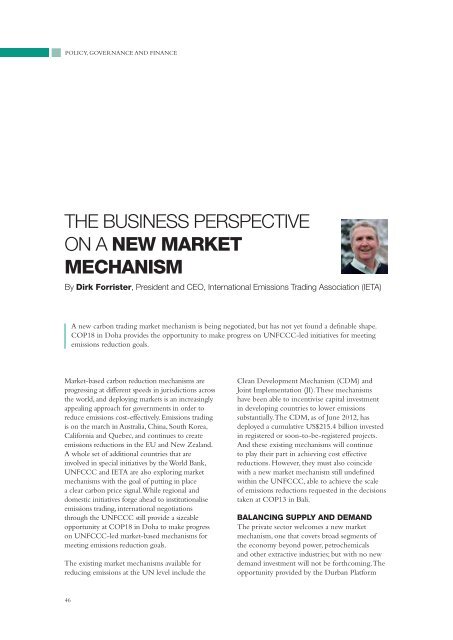Climate Action 2012-2013
Create successful ePaper yourself
Turn your PDF publications into a flip-book with our unique Google optimized e-Paper software.
POLICY, GOVERNANCE AND FINANCE<br />
THE BUSINESS PERSPECTIVE<br />
ON A NEW MARKET<br />
MECHANISM<br />
By Dirk Forrister, President and CEO, International Emissions Trading Association (IETA)<br />
A new carbon trading market mechanism is being negotiated, but has not yet found a definable shape.<br />
COP18 in Doha provides the opportunity to make progress on UNFCCC-led initiatives for meeting<br />
emissions reduction goals.<br />
Market-based carbon reduction mechanisms are<br />
progressing at different speeds in jurisdictions across<br />
the world, and deploying markets is an increasingly<br />
appealing approach for governments in order to<br />
reduce emissions cost-effectively. Emissions trading<br />
is on the march in Australia, China, South Korea,<br />
California and Quebec, and continues to create<br />
emissions reductions in the EU and New Zealand.<br />
A whole set of additional countries that are<br />
involved in special initiatives by the World Bank,<br />
UNFCCC and IETA are also exploring market<br />
mechanisms with the goal of putting in place<br />
a clear carbon price signal. While regional and<br />
domestic initiatives forge ahead to institutionalise<br />
emissions trading, international negotiations<br />
through the UNFCCC still provide a sizeable<br />
opportunity at COP18 in Doha to make progress<br />
on UNFCCC-led market-based mechanisms for<br />
meeting emissions reduction goals.<br />
The existing market mechanisms available for<br />
reducing emissions at the UN level include the<br />
Clean Development Mechanism (CDM) and<br />
Joint Implementation (JI). These mechanisms<br />
have been able to incentivise capital investment<br />
in developing countries to lower emissions<br />
substantially. The CDM, as of June <strong>2012</strong>, has<br />
deployed a cumulative US$215.4 billion invested<br />
in registered or soon-to-be-registered projects.<br />
And these existing mechanisms will continue<br />
to play their part in achieving cost effective<br />
reductions. However, they must also coincide<br />
with a new market mechanism still undefined<br />
within the UNFCCC, able to achieve the scale<br />
of emissions reductions requested in the decisions<br />
taken at COP13 in Bali.<br />
BALANCING SUPPLY AND DEMAND<br />
The private sector welcomes a new market<br />
mechanism, one that covers broad segments of<br />
the economy beyond power, petrochemicals<br />
and other extractive industries; but with no new<br />
demand investment will not be forthcoming. The<br />
opportunity provided by the Durban Platform<br />
46












